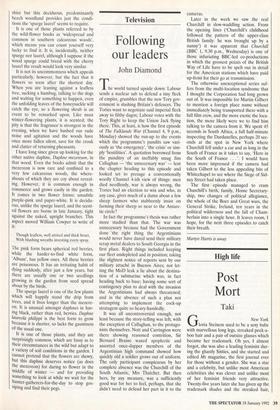Television
Following our leaders
John Diamond
The world turned upside down: Labour sends a nuclear sub to defend a tiny fleck of empire, grumbles that the new Tory gov- ernment is slashing Britain's defences. The Tories want to negotiate said imperial fleck away to filthy dagos; Labour votes with the Tory Right to keep the Union Jack flying there. This, at least, is how the first episode of The Falklands War (Channel 4, 9 p.m., Monday) showed the run-up to the events which the programme's pundits saw vari- ously as 'the emergency', 'the crisis' or sim- ply 'hostilities'. A quotation borrowed from the punditry of an ineffably smug Jim Callaghan — 'the unnecessary war' — lent the chapter heading to this episode and looked set to presage a conventionally woolly Channel 4-ish view of things: men died needlessly, war is always wrong, the Tories had an election to win and who, in any case, gives much of a damn about a few sheep farmers who stubbornly insist on farming their sheep so near to the Antarc- tic circle?
In fact the programme's thesis was rather more studied than that. The war was unnecessary because had the Government done \the right thing the Argentinians would never have dared send their military scrap metal dealers to South Georgia in the first place. Right things included keeping our fleet undepleted and in position; taking the slightest notice of reports sent by our military attaché in Buenos Aires; not let- ting the MoD leak a lie about the 'destina- tion of a submarine which was, in fact heading back to base; having some sort of contingency plan to deal with the invasion the Argentinians had always threatened; and in the absence of such a plan not attempting to implement the cock-up stratagem quite so heavy-handedly.
It was all uncontroversial enough, not least because the story-telling was left, with the exception of Callaghan, to the protago- nists themselves. Nott and Carrington were there showing reasoned contrition, Sir Bernard Braine waxed apoplectic and assorted once-dapper members of the Argentinian high command showed how quickly old a soldier grows out of uniform. The only participant conspicuous by her complete absence was the Churchill of the South Atlantic, Mrs Thatcher. But then hers, by any measure, was a sufficiently good war for her to feel, perhaps, that she didn't need to defend her part in it to the cameras.
Later in the week we saw the real Churchill in slow-waddling action. From the opening lines (`Churchill's childhood followed the pattern of the upper-class British family: he was brought up by a nanny') it was apparent that Churchill (BBC 1, 9.30 p.m., Wednesday) is one of those infuriating BBC-led co-productions in which the grossest points of the British Way of Life have to be spelt out in detail for the American stations which have paid up-front for their go at transmission.
The otherwise unexceptional series suf- fers from the multi-location syndrome that I thought the Corporation had long grown out of. It was impossible for Martin Gilbert to mention a foreign place name without immediately being transported there with a full film crew, and the more exotic the loca- tion, the more likely were we to find him talking to the camera from it. We spent 45 seconds in South Africa, a full half-minute inspecting the Dardanelles, perhaps 20 sec- onds at the spot in New York where Churchill fell under a car and as long in the South of France as it takes to say, 'Here in the South of France .. . I would have been more impressed if the camera had taken Gilbert to the less appealing bits of Whitechapel to see where the Siege of Sid- ney Street had taken place.
The first episode managed to cram Churchill's birth, family, Home Secretary- ship, two changes of political allegiance, the whole of the Boer and Great wars, the General Strike, Ireland, ten years in the political wilderness and the fall of Cham- berlain into a single hour. It leaves room, I hope, for the next three episodes to catch their breath.


















































 Previous page
Previous page